
Avoiding Surprises With Home Construction
Renovating a home can indeed have an impact on the title. Or maybe two impacts. These concern liens and permits.
- Whether you are buying a renovated home or plan to remodel the house yourself, be mindful of liens. Contractors place liens on homes for unpaid bills. Liens are clouds on a home’s title, and they usually have to be cleared before the owner can sell. And if you ever want to refinance, you’ll have to resolve the lien(s) to clear up the title.
- There is also the matter of whether the work was carried out under the correct permit process, in compliance with the building code. If not, title insurance coverage can get complicated. So can the process of rectifying any mistakes the previous owner might have made.
These two issues can have further impacts. For example, does title insurance protect a new owner for problems related to poor renovations? How will unpermitted work in the house impact the homeowner who goes to sell?
Here, we take a look at these various connections between renovations and the house title.
Contractors Can Record Liens on Property They Renovate
A lien, sometimes called a mechanic’s lien, represents an unpaid bill. Filing liens is a way for contractors, subcontractors, or material suppliers to compel payment from customers for completed jobs.
The notice of the lien is recorded in the county. It is filed together with a property’s deed and other legal documents. Because it is recorded, it puts the public on notice of the debt against the home.
If you’re the one hiring a renovation team, will you receive a notice from the contractor before the lien is recorded? It depends on whether your state law requires contractors to notify you or not.
Sometimes, owners are unaware that liens are filed. And the longer the homeowner waits to address the lien, the harder it can be to track down the contractor and resolve it.
How can you avoid having a lien overhanging your home? Along with the estimate for the work, ask the renovator for the names of the subcontractors and material suppliers involved in the job. Ask for a written agreement, including lien and release of lien information, along with the pricing for every element of the work.
Finally, be sure the work meets your expectations before signing off on a final release or handing over the final payment. The basic idea? Be aware of the possibility of liens at every stage of the renovation process.
Some Owners Fail to Get Proper Permits for Renovations
Building permits are not required for repairs or small additions, but for safety reasons they are needed for most significant construction jobs and renovations.
When poring over the listings of homes for sale, look for any indications of unpermitted work. Construction without the required permits should be declared. The listing will include a statement that there’s 1 bathroom plus an unpermitted half bathroom, or similar language.
The title company and the mortgage lender will view the market value of the house as including only the sections that are in compliance. An unpermitted addition to the house doesn’t constitute property value.
Lenders might not even agree to issue a loan for an as-is home with unpermitted renovations.
When You Didn’t Know: Will Title Insurance Help?
What if the house you buy didn’t come with any indication of the unpermitted work? It’s not uncommon to discover issues down the road.
Perhaps you see cracking. You call an engineer, who informs you that a weight-bearing wall got taken out during renovations by a previous owner.
If you bought an owner’s title insurance policy at closing, it should protect you against title defects, and it looks like you’ve found one. In short, you didn’t get the value you believed you were getting when you took title to your home.
But whether your title insurance covers unpermitted construction might depend on whether you have standard or extended title insurance, or whether there’s some kind of endorsement for unpermitted construction. If you do have coverage, and can demonstrate that you as a buyer were unaware of the unpermitted construction, your insurance may cover new permitting costs. Expect to pay a deductible.
What About the Repair Work You’ll Need?
Now, you’ll need to do major work. Again, check the title policy. If it covers the repair work, does a code violation have to be recorded for insurance to apply? As you see, insurance questions can get circular. An insurance company will typically avoid paying any claim it can find a reason to deny.
Meanwhile, the homeowner with unpermitted renovations will naturally be concerned about the cost of bringing the construction up to code. A structural engineer can assess the work and explain what must be done. Contractors can explain how they will work with the local building authority.
Some local building authorities protect unsuspecting home buyers from compliance fees or tax hikes related to unpermitted prior construction. And retroactive permitting for completed construction could be an option. This could streamline the repair project. It can mean that the job will not have to be completely redone.
What About Homeowner’s Insurance Coverage?
Insurance companies generally place a cap on payouts. Moreover, your homeowner’s policy might cover structural damage and hazards yet not cover permitting work. It depends on the company. If something went wrong in the house, you could be covered for repairs, but on your own for the extra work that’s necessary to meet the building code.
Fire damage claims are most likely to be covered. Many other things are likely to be excluded. Unpaid costs can be significant. And faulty construction may be excluded from the policy entirely.
Call your insurance rep to understand how your policy would work in the case of something going wrong because of unpermitted work.
Who Else Might Be on the Hook?
In the interest of fair dealing, do the real estate professionals who assisted with the homeowner’s purchase have duties to help?
Review the disclosure statement submitted by the seller at the time of the purchase agreement. Did the seller disclose unpermitted construction? Or did the disclosure document misleadingly skip over the issue? If you were misled, the previous owner could be one of the people potentially on the hook.
Real estate agents, sellers, and inspectors all have legal responsibilities. The question is whether they knew of (or reasonably should have found) the issue, and made you aware of it when you bought the house. If they misled you when selling you the house, a local real estate lawyer could review the facts and apply state law, and lay out your legal options.
If a contractor was involved in the work, that person could also potentially be held liable.
A consultation with a lawyer is necessary, because the facts of each case are house-specific. Local permitting rules, state laws, and professional duties all interact with each homeowner’s situation in a unique way.
What Is Your Duty to Disclose?

If the previous owner was a DIY renovator, and you haven’t had any issues with the work, it could still be an issue when you convey the home to someone else. Before having the home listed for sale, understand that buyers, their agents, appraisers and inspectors will want information. Real estate professionals will consult the house’s prior deeds and blueprints to find out if modifications, additions, or remodel work was done by you or prior homeowners.
If you know someone carried out unpermitted construction on your home, you’ll disclose that to potential buyers. Most states issue disclosure forms, and unpermitted work is one of the issues the seller must disclose.
If you sell as-is, you need to make those disclosures. And the buyer (and the buyer’s lender) will need to be willing to accept the home as-is.
The best way forward is to get a permit for the renovation before selling your house. Note that the local building authority can always examine your home’s renovation status, and can require owners to obtain permits for prior unpermitted work.
In a Nutshell: Key Tips for Homeowners
The best way to avoid a tangled web of problems is through advance knowledge. If you’re renovating your home, get the necessary permits. And be sure any billing and liens are resolved.
For a buyer, finding “newly renovated” in a listing description is usually a good sign, but it should also prompt the buyer to ask questions about those renovations. Get proof of proper permitting.
And you’ll want to know what your title policy covers in case surprises arise. Pick a title insurer with a solid reputation and a willingness to talk you through the provisions of the available policies.
Supporting References
ARAG North America, Inc.: Home and Property – Avoiding a House Lien During Remodeling.
Bob Aaron in the Toronto Star: Conversations – Renovations May Hide Problems From Home Buyers (Apr. 3, 2014).
Photo credits (both): Tima Miroshnichenko, via Pexels.
